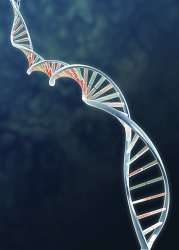Gene study sheds new light on origins of British men

(PhysOrg.com) -- New genetic evidence reveals that most British men are not descended from farmers who migrated into Europe from the east 5,000–10,000 years ago – contrary to previous research.
Instead, scientists from the Universities of Oxford and Edinburgh say that most European men can trace their lineage to people – most likely hunter-gatherers – who had settled in Europe long before that time.
The study, published in the journal Proceedings of the Royal Society B, aims to correct an analysis of genetic data published last year. It had reported that most British men came from people who migrated, with the spread of agriculture, from the Near East.
George Busby of the Department of Zoology at Oxford University, and first author of the study, says: "It had been suggested that the majority of European males could trace their paternal ancestry to the men who spread out of the Near East under 10,000 years ago and brought farming and agriculture to Europe. Our larger study fails to find support for this idea."
More than 100 million European men have a set of genes on the Y chromosome called R-M269, including about three-quarters of British men. A key question in understanding the peopling of Europe is when this group spread out across the continent.
The researchers say their work shows that the outcome can vary enormously with set of genes chosen to estimate the age of this group of men. They add that the previously reported east-west pattern is not found in their larger and more comprehensive dataset. This, the Oxford–Edinburgh team says, leaves little evidence for a farmer-led dispersal of this major group.
Co-author Dr. Jim Wilson, of the University of Edinburgh’s Centre for Population Health Sciences, says that the paper shows for the first time that certain properties of the genes studied strongly influence the accuracy of the date estimate.
"Estimating a date at which an ancestral lineage originated is an interesting application of genetics, but unfortunately it is beset with difficulties and it is very difficult to provide good dates. Many people assume that the more genes the more accurate the dates, but this is not the case: some genetic markers are more suited to dating than others."
The study also reports that different subgroups of the R-M269 group are very common in different parts of Europe, consistent with expansion of these subgroups in each place.
Dr. Cristian Capelli of the University of Oxford, who led the study, says: "The peopling of Europe, and how farmers from the Near East mixed with or supplanted the hunter gatherers already here, has been the subject of debate for 20 years. Our work shows the limitations of common methods used to deduce the genetic history of male Y chromosomes on which these arguments had been based."

















